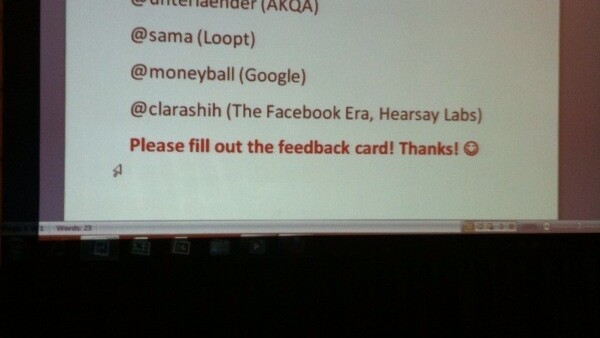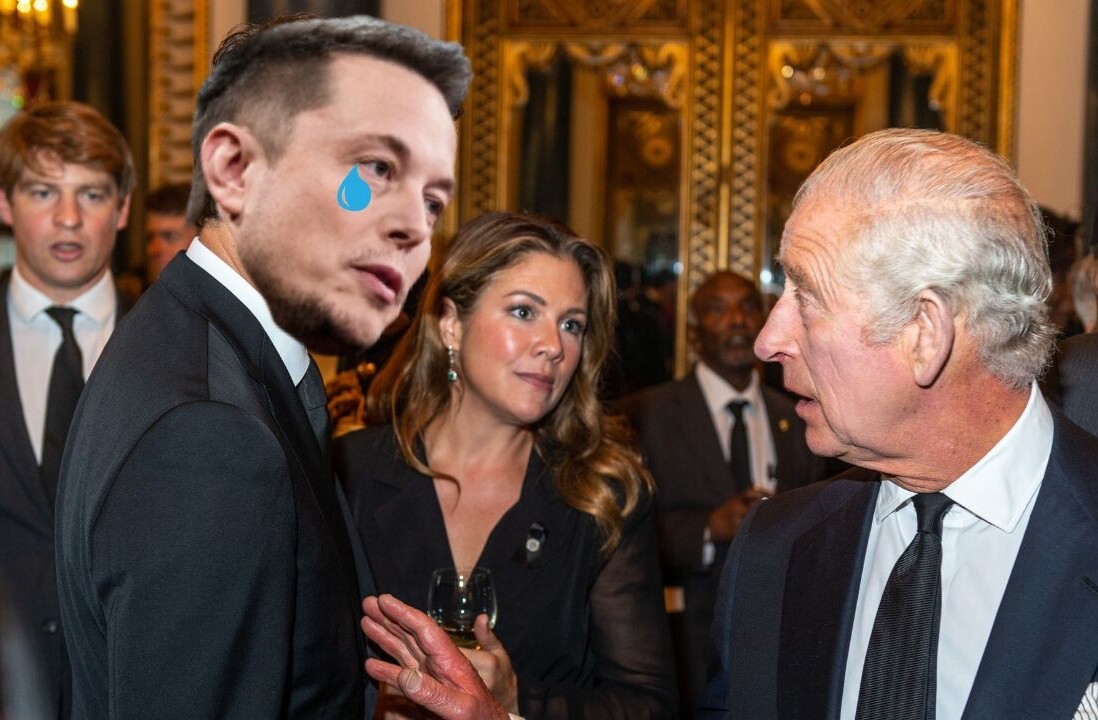
 These are my real time notes from the “You are your Location” panel at SXSW.
These are my real time notes from the “You are your Location” panel at SXSW.
Ryan Sarver – Twitter
Steve Lee – Google Latitude
Clara Shih (Moderator) – Author of the Facebook Era
Sam Altman – Loopt
Tina Unterlaender – AKQA agency
Here is a summary of what stood out for me:
- Google Latitude will soon expose an API
- Google is looking to add location to many of their properties. Example: a calendar app that turns on Latitude for specific times
- Location recommendations are coming. Large check-in / location data sets are being built.
- 8M current users of Geo apps, 40M users of mobile local directories like Yelp.
- Just like growth in broadband drove the web’s growth, growth in Smartphones is driving geo apps
- Lots of work being done on location prediction – predicting where you will go based on your past checkins. On the aggregate, this could impact city planning, traffic, etc.
- There is no such thing as anonymous location data. It’s easy to de-anonymize location data.
- Stealth app that uses location to capture traffic flow, proactively predict customized routes for you to avoid traffic.
Here are my full notes from the panel – please excuse typos as I tried to take everything down.
90% of room uses geo apps.
What is a life graph?
Altman: set of all places you’ve been. Where you have gone, where you have spent your time. Loopt Pulse shows events nearby. Recommended events based on history – life graph enables recommendations, creating huge dataset.
Lee: Recommendations is a great thing to be done with history. Also, share your travels with family and friends. Geotagging photos. ID restaurants and museums you’ve been to.
Sarver: Places you go tell who you are. Self expression. Place is an identifier, gives context to a person.
Unterlaender: adding a layer. Adding geolocation to social graph. You know now exactly what your doing, how many cokes you drank, how many calories. Behavioral + geolocation.
So how big is this market?
Lee: function of Smartphone + unlimited data plans. As smartphones grow, this market will grow.
Sarver: no location killer app. Every app will have location embedded in, so more people will start using.
Altman: 8M users of geo app right now, 40M users local directory.
Unterlaender: Using location for brand campaigns. location based advertising is coming.
How can individuals leverage their own location data?
Lee: couple of ways to collect this data. Explicit checkins. Latitude is more passive, works in background. Both models are complementary. Latitude is for early adopters right now – you can visualize the data with Google Maps, let people convert geo data to venues. Probs with checkins, is that you don’t’ always remember to check in, or it might be socially awkward.
Sarver: Starbucks coupon example where phone buzzes when they walk by Starbucks. Sucks for people that don’t like coffee. Checkins tell user interest, passive doesn’t.
Altman: android app, collects location history, learns patterns, and predicts traffic. Learn about driving patterns, warn you about traffic problems.
Privacy?
Altman: Anonymous location history doesn’t exist. Can be totally deanonymized. No such thing as anonymous location data.
Lee: Latitude history is really sensate data. What’s important is developing super compelling services that mean a lot to people. Needs to be opt in. Google is working on exposing an API for latitude, developer preview in the next few months. Exposes data to third party developers.
Unterlaender: Users have to opt in.
Altman: has to be value for users. Can’t be solely commercial. If you provide value, users will use it.
Different models… passive and explicit check in? How do you reconcile pros and cons?
Sarver: going to a hybrid model. Some stuff in the background, some explicit.
Altman: absolutely hybrid, don’t see any other way.
Unterlaender: different types of users. Passive users, and active users who like to blast out. Started a year ago, now can make an impact.
Are checkins becoming commoditized? How will apps differentiate themselves?
Lee: it comes down to what the motivation is. If they are at a cool bar, they want to blast out. Walgreens is a different story. Maybe you blast out to get a coupon. Or maybe it’s just a life graph, recording mechanism.
Altman: checkin has no inherent value, neither does latlong. It’s all about what you do with it. What is the application. What does it do for the user.
Sarver: Location acquisition is getting easier, now people can innovate on top. Now data is becoming easier, simplegeo. People can now innovate on top.
Altman: first panel was how hard it was to get location data. Now it’s easy, almost open. Leading to explosion.
Unterlaender: We can finally use location information in smart and interesting ways. We can now use location to deliver useful info.
What about interoperability? Standards coming into play?
Sarver: w3c geolocation pa. Browser guys came together, and became a spec in one year. This powers a lot of buzz stuff, a lot of browser stuff.
Lee: HTML5 geolocation is spreading on mobile and desktop browsers. Also, Latitude API is coming.
Sarver: let’s get location embedded in everything and then we can figure out standards.
What about iPad?
Altman: want to support all devices.
Hurdles to mass adoption?
Lee: Smartphone adoption is the key driver. As penetration goes up, so will geolocation adoption. We are still learning about the space however.
Altman: smartphones
Sarver: handling the privacy issues. Hopefully no major service will screw up.
Altman: this has happened in other countries. Whole industries shut down when a big company screws up the privacy part.
Unterlaeneder: There are so many services out there. This is tough for brands. Different ids for different services. Same problem in location. Tough for brands to connect the dots.
What will this space look like in two years?
Sarver: we look three months out.
Unterlaender: from an ad perspective, time to learn more about the user. Ad world has changed. Two way communication. Brands need to learn to respect location privacy, and deliver wanted info. Make advertising not feel like advertising. Get a better deal, have a better day.
Sarver: location can make people more social in real world. Tech can help real life socialization. FS talks about city guides… this is where it should go.
Lee; More utility coming. Calendar services. Share location for small windows of time. Sharing location within the context of a calendar. Google Latiude + Calendar? And how about Google Voice.
Altman: agree. In two years, many services that we don’t think of as location services will become so.
In terms of interoperability, none of the players talk to each other. How does that work?
Lee: opportunity for many players. Different services for different times.
Altman: I think Facebook will become the central hub for location.
Altman: real privacy danger is the unwitting usage. Turn on Google Latitude. Put it in your trunk. Forget about it. This is dangerous.
Shih: photos can be uploaded and geotagged without your knowledge.
Anybody working with predictive modeling?
Lee: Google is starting too. Location alerts. Receive nearby alerts when you are traveling. Predict where people are going.
Sarver: this is super interesting, and yes companies are working on it.
Altman: yes, interesting. We’re starting to look at it.
And on a community basis, this could help traffic no?
Altman: most common is hedge funds. Buy location data about what stores people are going to to predict sales.
Shih: on an aggregate basis, this could be very helpful for urban planning or health agencies.
Lee: there needs to be incentives to get users that data. No private location data.
Latitude API? Oauth model? Are you thinking about letting the user set privacy settings on a person by person basis?
Lee: V1 will be straightforward. User will give permission per application.
Altman: also working on API. Once the data gets released, we lose control. Once we give latlongs, tough to enforce.
How do we cross the chasm to Normals?
Sarver: when smartphone adoption goes mainstream.
Altman: agreed. And as devices start including location as core phone experience.
Shih: We’ll get smart about location, but it will take time
Altman: Most of the world is pretty boring. Go to work, come home. Cool new bar scenario is unusual. Value needs to be provided.
Question from our own Chad: Will we see consolidation?
Altman: we will see massive consolidation in the next 9 months.
2nd question from Chad: International plans. China, Japan, etc.
Altman: When markets get to US level of smartphones, that’s when we move.
Are these international habits and patterns?
Altman: cultural differences, but some universal patterns.
Geolocation awkwardness:
Altman: Told friends he was sick. Went to coffee shop and worked. Friends busted him.
Shih: it’s awkward because it’s all new to us.
Multiple data sets. It’s a problem.
Altman: we’re talking about this right now with other players. Try to get to some central venue to id mapping app.
Sarver: huge pain point in app.
Altman: matching venue to venue is the prob.
What about businesses that want to share info. How do businesses do better businesses.
Answer: Food carts.
Altman: location based coupons from small businesses. Loyalty card model is most interesting. Frequent flyer programs. Loopt is focused on that.
Battery life issue?
Lee: important for apps in the background like Latitude. Battery life issue is huge. One way to combat is not always use gps. You can use hybrid of IP address triangulation. Other way is not to record your location when you are not moving, aka in the office for 8 hours.
Get the TNW newsletter
Get the most important tech news in your inbox each week.

![Reblog this post [with Zemanta]](https://img.zemanta.com/reblog_e.png?x-id=26ce6b91-5508-488b-a77c-bc4cef121d1a)




